What Should the Mother of the Bride Not Do? Key Etiquette Mistakes to Avoid
When it comes to your daughter’s wedding, your role as the mother of the bride is a blend of supporter, helper, and gracious guest. While it’s a day filled with joy and celebration, it’s crucial to navigate it with a keen sense of etiquette and understanding of your place in the array of festivities. Being aware of what not to do is just as important as knowing what to do. Steering clear of some common pitfalls will help ensure that the day remains focused on the happy couple.
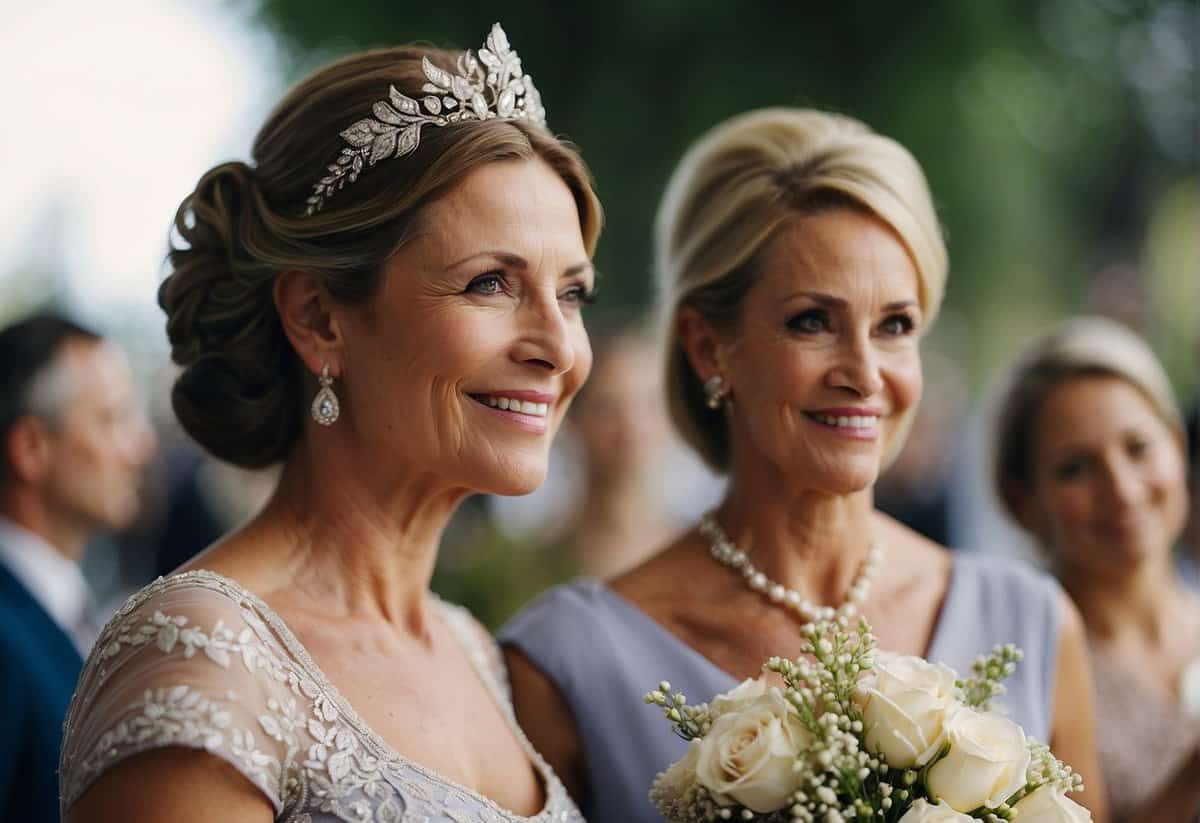
Avoiding overstepping boundaries is key. Whether it’s during the planning stages or the actual wedding day, it’s essential to remember that while your insight and experience are valuable, the final decisions rest with the couple. It’s a balancing act of providing guidance when asked, and stepping back to allow them to forge their own unique celebration. Moreover, interactions with guests, family members, and vendors call for diplomacy and poise, as your demeanor sets a tone for the event.
Key Takeaways
- Embrace a supportive role and avoid overshadowing the couple’s wishes.
- Maintain respectful and polite interactions throughout the wedding.
- Offer guidance when sought and trust the couple’s decisions.
Understanding Your Role
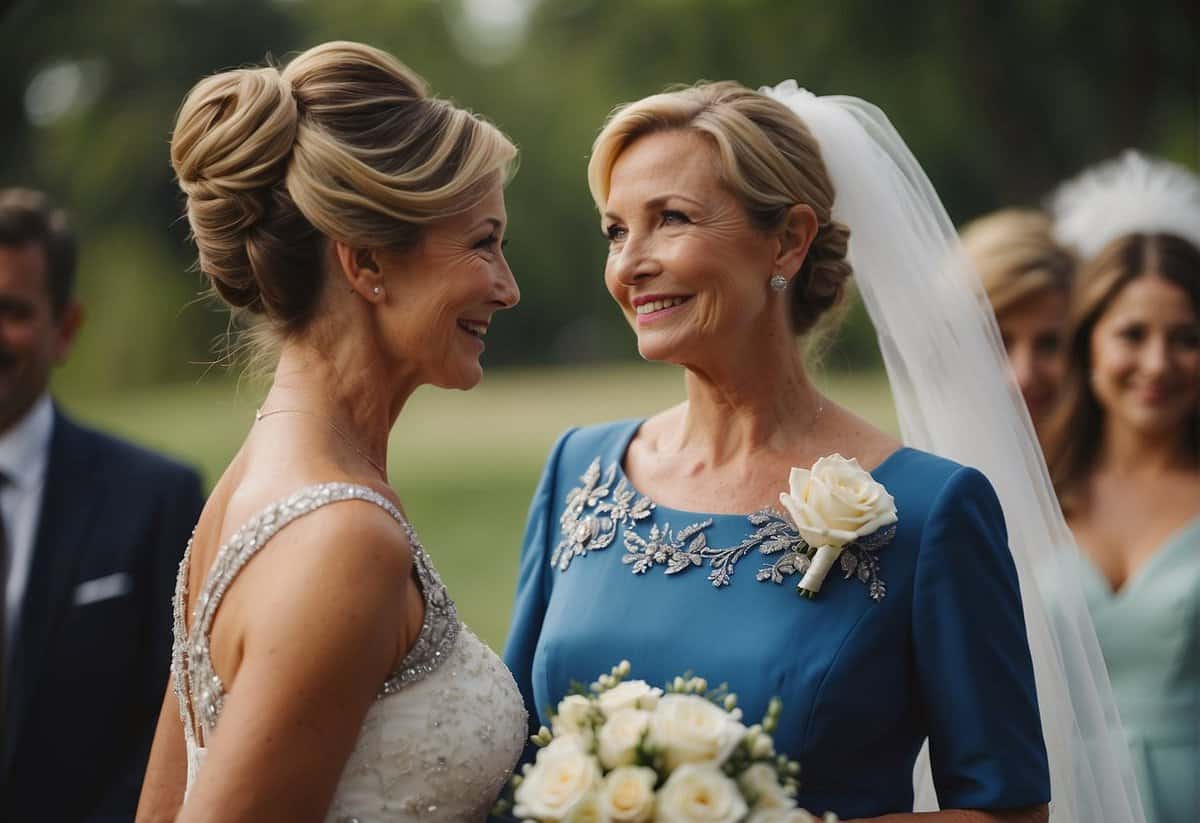
As the mother of the bride, your approach to the wedding is crucial. You provide invaluable support and respect for the couple’s decisions, balancing your involvement carefully to ensure the wedding planning process is a joyful experience for everyone involved.
Support Over Authority
Your daughter’s wedding is a significant milestone, and while you play a vital role, it’s important to remember that support should always come before authority. Your job is to be a comforting presence, offering consideration and support as your daughter navigates through this major life event.
- Respect your daughter and her partner’s choices, even if they differ from your own preferences.
- Support the couple by being the point person for vendors when needed but always defer final decisions to them.
- Be ready to step in as a secondary contact for the wedding planner or vendors, ensuring you’re assisting, not dictating.
Wedding Planning Participation
As part of the wedding planning process, it’s essential to understand your participatory limits:
- Respect the couple’s choices: Offer ideas when asked, but avoid overstepping.
- Assist the Wedding Planner: Function as a helpful liaison if required, but allow the wedding planner to take the lead.
- Consideration for Hosting: Take pride in welcoming guests and helping to create a warm atmosphere, reflecting the couple’s wishes for their special day.
In fulfilling these roles with grace and respect, you ensure your daughter’s wedding is memorable for all the right reasons, and your relationship with her remains strong and positive.
Decorum and Behavior
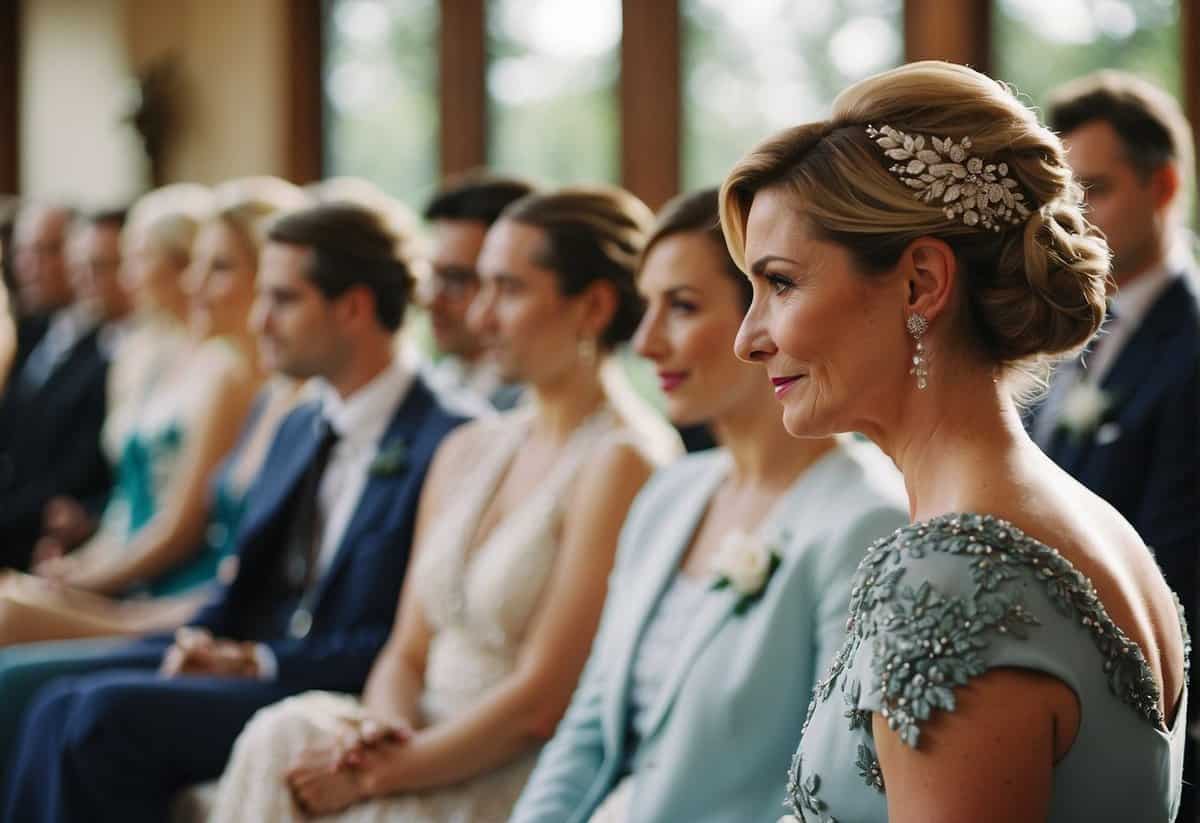
When attending your daughter’s wedding, it is crucial to carry yourself with grace and respect the couple’s preferences. Your actions and decisions should contribute positively to the celebration and joy of the day.
Dress Etiquette
You play a significant role in setting the tone through your attire. It is recommended to select a dress that complements the wedding’s style and color scheme. Keep in mind that you should traditionally choose your dress before the mother of the groom, ensuring that both dresses strike a harmonious balance without being identical. It’s also considered thoughtful to coordinate with the bride about your outfit choice to avoid any last-minute clashing or discomfort.
Ceremony and Reception Conduct
Your behavior at both the ceremony and the reception is a reflection of your respect for the couple’s big day. During the ceremony, take a seat in the place designated on the seating chart and avoid any disruptions.
At the reception, be mindful that your toast should honor the couple and not embarrass them with overly personal stories or jokes. When navigating the dance floor, be considerate of the couple’s first dance and give them space to enjoy their moment. Regarding the guest list, understand that the couple may need to make tough decisions due to venue size or budget, and it’s important to support these choices without insistence or pressure.
Relationships and Interactions
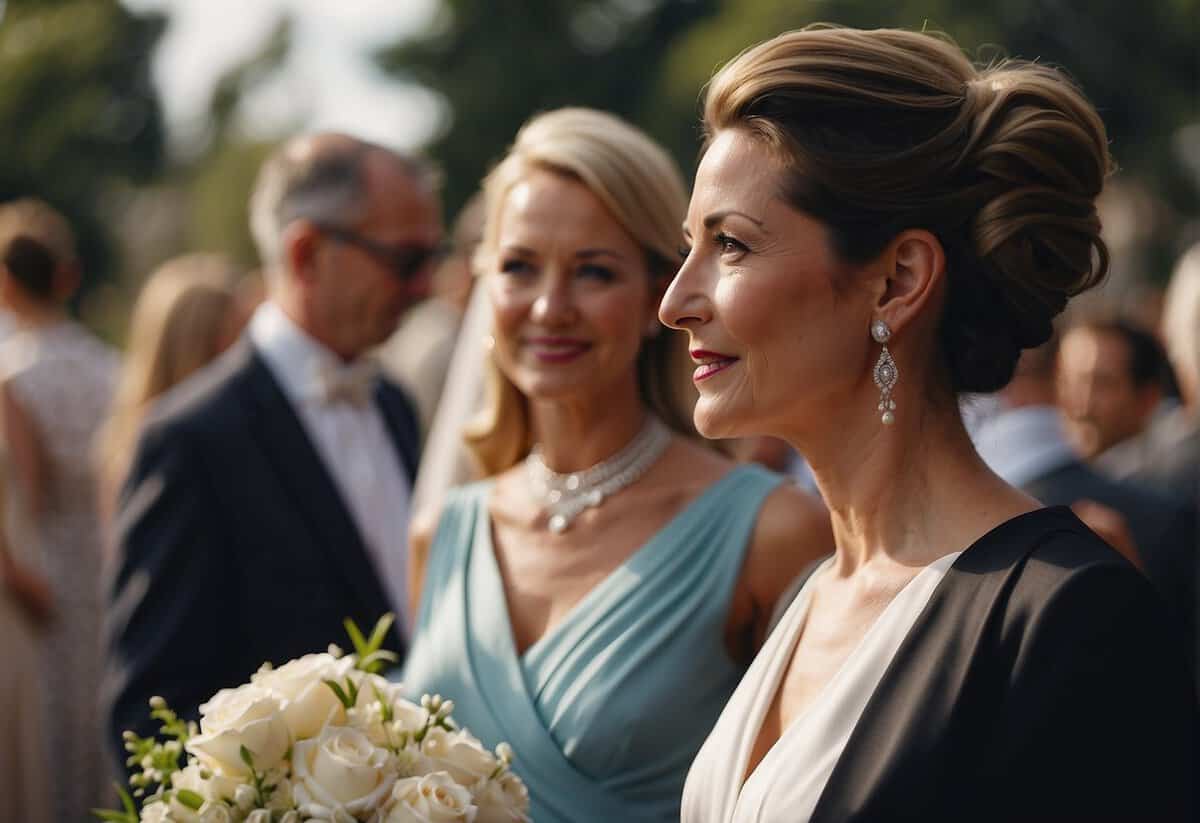
As the mother of the bride, your role in relationships and interactions can set the tone for the wedding festivities. Remember, your approach to people and situations directly affects the bridal party and the overall harmony.
Bridal Party and Relatives
When dealing with the bridal party and relatives, strive for a supportive yet non-intrusive stance. Here are a few specific points to consider:
- Respect Boundaries: Avoid stepping into the duties or limelight of the maid of honor or overshadowing the mother of the groom. Each role in the bridal party comes with its own set of responsibilities, and it’s crucial to support them without taking over.
- Facilitate Compromise: At times, conflicting opinions may arise between relatives or bridal party members. Encourage compromise and discreetly help navigate any disputes to maintain a peaceful atmosphere.
Engaging with Vendors
Interacting with vendors requires a delicate balance; keep these pointers in mind:
- Follow the Couple’s Lead: The couple may have specific visions for their wedding. Support their choices and intervene with vendors only if asked.
- Avoid Micromanaging: Trust that the professionals hired have everything under control. While it’s understandable to be invested in the wedding, micromanaging can lead to unnecessary stress for you and the vendors.
In managing wedding costs, offer your opinions diplomatically, and always prioritize the couple’s preferences. Remember that being the mother of the bride means being a pillar of support, not the manager of the event.
Additional Responsibilities

In preparing for your daughter’s big day, as the mother of the bride, your role comes with specific additional responsibilities that extend beyond emotional support. These additional tasks are pivotal in ensuring that the pre-wedding events and the day of the celebration unfold smoothly.
Pre-Wedding Events
Bridal Shower: You may be asked to assist in planning or hosting the bridal shower, an event that traditionally honors the bride. Ensure RSVPs are managed efficiently, and that the guest list aligns with the bride’s expectations.
Dress Shopping: Your presence at dress shopping is not just about the selection of the gown; it’s also a time to bond and share in the experience. Offer your genuine feedback but remember that the final choice should reflect your daughter’s style and comfort.
Venue Selection: While providing input for the venue is important, always prioritize your daughter’s preferences. Your role is to help weigh options, not to make decisions.
Day-Of Assistance
Welcoming Guests: On the wedding day, make efforts to greet guests warmly, making them feel appreciated and included in the celebration. Your role here is pivotal for setting a hospitable tone.
Emergency Kit: Prepare an emergency kit with items like safety pins, stain remover, and band-aids. These small tokens of foresight can address unexpected mishaps and alleviate stress for your daughter.
Father of the Bride: Coordinate with the father of the bride to ensure you’re both available for key moments, such as walking down the aisle or participating in traditions. Your cooperation showcases unity and support which is comforting for the bride.
Remember, while assisting in wedding planning and events, your role is vital in supporting your daughter’s vision and fostering a joyous and celebratory atmosphere.
Frequently Asked Questions
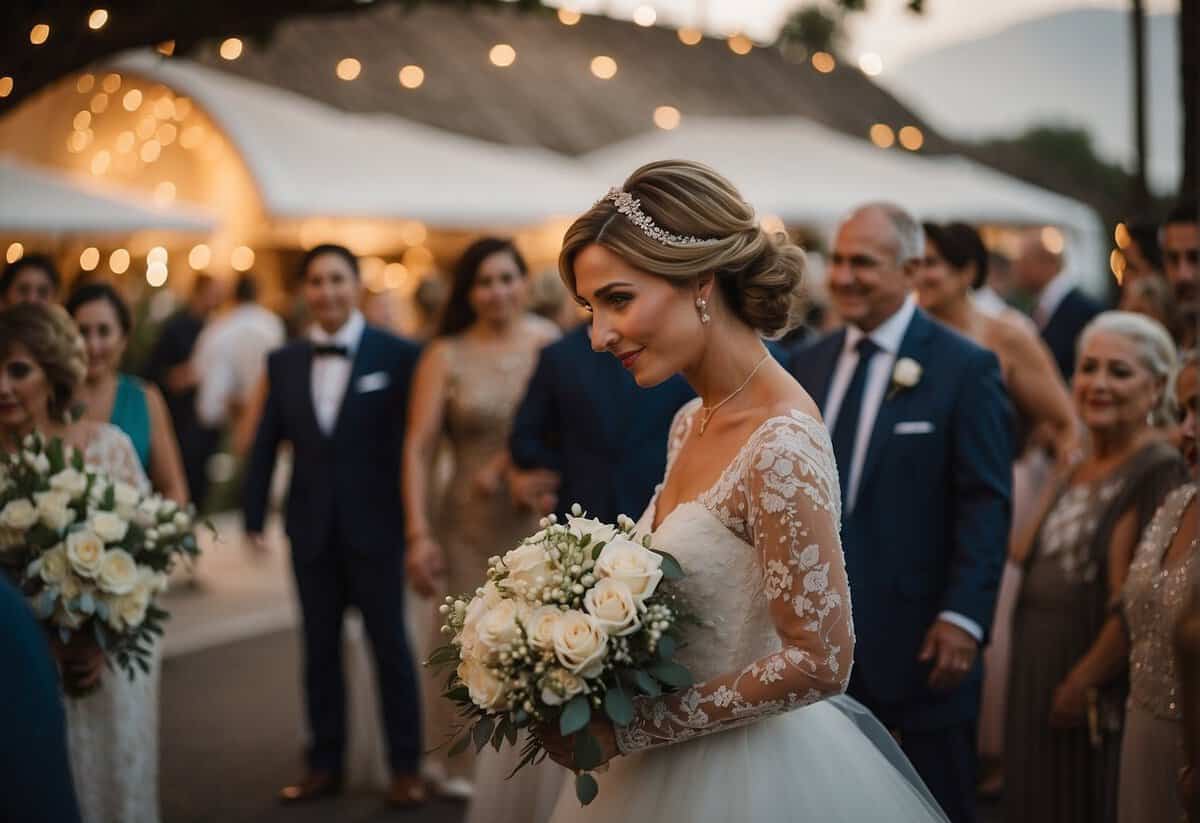
When navigating the role of the mother of the bride, you may have questions about etiquette, involvement, and tradition. Let’s address your queries with clear guidance to ensure a joyous wedding experience.
What are some friendly dos and don’ts for the mother of the bride?
You should support your daughter and provide input when asked, but it’s crucial to avoid taking control of the wedding or being overbearing. Trust in the professionals hired for the event, and let them manage the day.
How can the mother of the bride avoid feeling left out during wedding preparations?
Remain proactive in communication with your daughter and the wedding planning process, but also respect her decisions. To maintain a sense of involvement, offer help in areas you’re passionate about but where your daughter may need support.
What are the traditional responsibilities of the mother of the bride?
Traditionally, your role may include helping with the guest list, dress shopping with your daughter, and sometimes hosting or co-hosting bridal showers or other events. Your involvement can vary based on your daughter’s preferences and needs.
How can the mother of the bride deal with feelings of depression during the wedding planning?
It’s important to communicate openly with your daughter or seek professional support if feelings of depression arise. Acknowledge your emotions and make time for self-care, ensuring that you can be present and supportive during the wedding celebrations.
Is it customary for the mother of the bride to give a gift to her daughter on her wedding day?
It is a heartfelt gesture to give a meaningful gift to your daughter on her wedding day. Whether it’s a family heirloom or a personal letter, a thoughtful present can symbolize your love and support.
What are some mother-daughter wedding traditions that can be included in the ceremony or celebration?
Common traditions include the mother helping the bride with her wedding dress and veil, participating in the processional, and sharing a special dance. You can also create your own traditions that are meaningful to you both.



